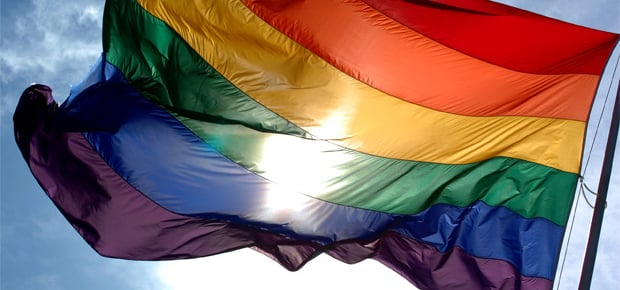
Intelligent, powerful and well-meaning allies do themselves and the community a disservice when they kneecap otherwise groundbreaking contributions to the human rights' discourse, writes Siya Khumalo.
There is a tendency among progressives and social justice activists to nitpick the work and words of allies and colleagues. While this is often done harshly — emphasising weaknesses over strengths — it's a practice that can't always be wholly abandoned.
With that preface, I invite the reader to watch Queen Naa Tsotsoo Soyoo I's courageous advocacy for the Ghananian LGBTI community. Share it; research her data; reference it in letters to lawmakers and embassies regarding the legislation.
However, there are habits in it that we need to entrain ourselves out of or risk opening the door to moral and political blackmail down the line. For instance, she opens by apologising for using "vulgarities". I didn't pick up a single vulgarity in this 22 minute 13 second excerpt, but let's accept that she's negotiating her listeners' conservativeness.
The speech itself is fairly comprehensive and coherent, covering what the law does and doesn't say on the use of sex toys, participation in threesomes and so on. To distil it in one line, there is nothing good to be gained from criminalising the actions of consenting adults who aren't harming anyone. It's a slippery slope where the definition of "carnal acts against nature" will grow into a political weapon.
She also touches on the use of religion as a justification for bigotry. Her points on this are mostly excellent: Hitler thought (or said he thought) that he was doing God's work when he set up the anti-Semitic systems and carried out the murders that he did. Christianity and Islam are foreign to Ghana, while the country's indigenous cultures have historically respected same-sex unions. Where it gets a bit grey is when she says that if any among the religion is without sin, they should cast the first stone.
Downstream effects of confusion
On the one hand, this says to religious people, "Assuming that your religious understanding that sexual and diversity is a sin, let's see your perfect moral track record before we criminalise this particular sin". On the other hand, this rhetorical statement doesn't clarify that the assumption is provisional — it's there for the sake of argument. And so you have people of faith who are left with the messy dilemma of being unable to criminalise sin on the one hand, but also unable to condone it on the other. We shouldn't hold the Queen responsible for the downstream effects of this confusion because the space she was speaking in was legislative, not religious. In other words, while it would have been ideal for her to go off on a tangent into the nuances of religious ethics, she was within her rights to stick to the subject within the legislative space as well as, probably, the time limit.
Then at the end of her speech, she gives a message to the LGBTI community, basically saying to be more restrained in their advocacy.
She says to give people room to "think through", "to understand", because when you go in gung-ho and insist the person accept your point of view, it creates resentment and is counterintuitive.
It doesn't matter how accurate these last few points are: LGBTI people didn't create this situation, or write the bill (as far as we're aware); it is our community that's been put on a deadline to advocate. The queen herself is proof that there can and should be a limit to the patience extended to homophobes. If she can so clearly grasp the matter, why can't others apply their minds and their moral conscience the same way? If they can't, then what's the point of her talking to them?
"The letter and the spirit of the proposed bill seeks to deliberately obliterate the line between conduct that causes harm and honourable [Sam Nartey] George demonstrated that when he equated armed robbery and homosexuality," she points out.
She also points out, "We have plenty of evidence in Ghana where heterosexuals are abusing little kids.
We only have to look in our classrooms."
In other words, the people already have the understanding she says, LGBTI advocates should give them room to develop. If the tables were turned, and straight people were fighting for the right to have non-procreative sex, there would be no tone-policing. When black people fight for the right not to be killed by the agents of racist systems, plenty of allies defend our anger and intensity.
When women are patient towards us men, when we default to abusing male privilege instead of living out equitable values, it shouldn't be thought that those women are being "sensitive" to the context of traditionalist expectations. They're paying the price for our privilege, end of story. But when this is expected of women, then we're all complicit in enabling and legitimising misogyny.
Back to the nitpicking: someone could read this and say I'm mansplaining. I'd reply that by that logic, she's straightsplaining. Of course, I think she's advocating and demonstrating allyship, which is a healthier trade-off than sheer silence on her part. Moreover, I'm not Ghanaian, and I understand that this is ultimately queer Ghanaians' fight first and foremost.
The point I'm making is that if there never was a time when homophobia was right — though it was legislated over-and-against an accepting society — then any patience that's extended to legislated homophobia is, while a necessary evil, still just that: evil.
- Siya Khumalo is the author of You Have To Be Gay To Know God (2018). He is also a Mr Gay South Africa runner-up and Mr Gay World Top 10 finalist.
To receive Opinions Weekly, sign up for the newsletter here. Now available to all News24 readers.
*Want to respond to the columnist? Send your letter or article to opinions@news24.com with your name and town or province. You are welcome to also send a profile picture. We encourage a diversity of voices and views in our readers' submissions and reserve the right not to publish any and all submissions received.
Disclaimer: News24 encourages freedom of speech and the expression of diverse views. The views of columnists published on News24 are therefore their own and do not necessarily represent the views of News24.




 Publications
Publications
 Partners
Partners























